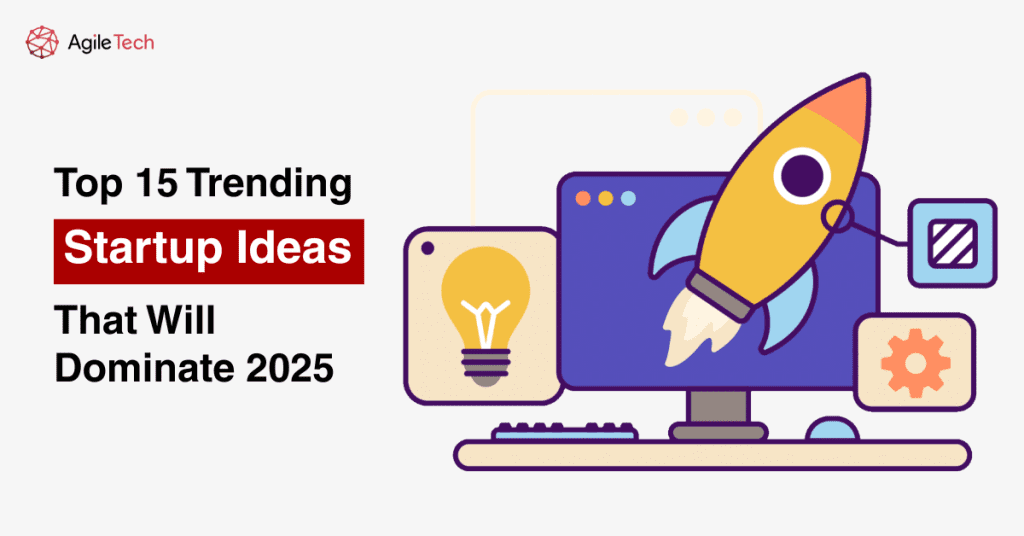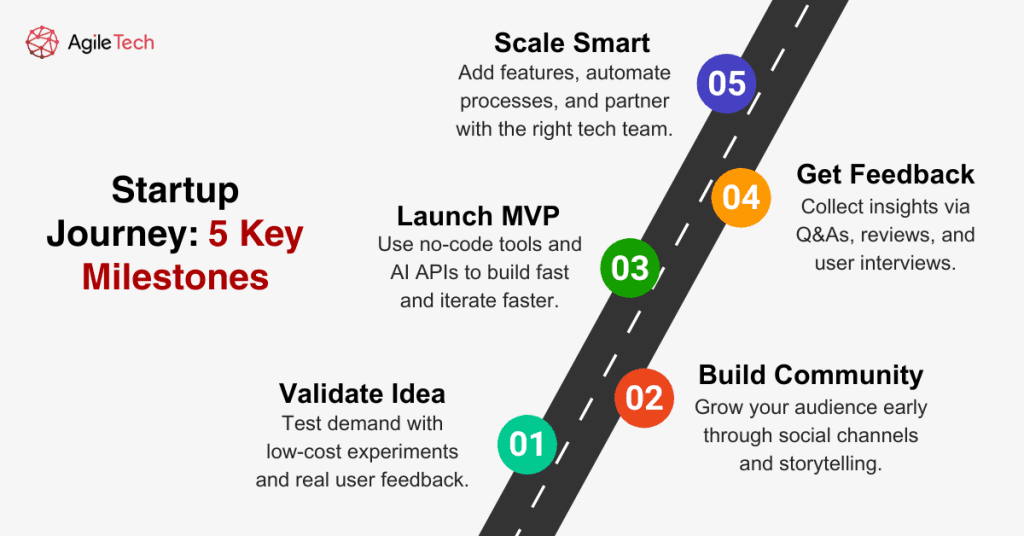Top 15 Trending Startup Ideas That Will Dominate 2025
Launching a startup in 2025 isn’t just about spotting gaps; it’s about understanding where the world is headed. From post-pandemic behaviors to Gen Z consumer values, AI automation to decentralized platforms, this year’s best startup ideas tap into deeper shifts in how people live, work, and relate to products and communities.
In this list, we break down the 15 most future-ready startup opportunities. Whether you’re a solopreneur or building a scalable tech company, these ideas are backed by consumer demand, technology enablers, and low-barrier validation models.

- 1. AI-Driven Consulting Services
- 2. Resale-Based Microbrands
- 3. Creator-Led Learning Platforms
- 4. Specialized Medical Logistics
- 5. AI-Powered App & SaaS Development
- 6. Hybrid Senior Care + Smart Tech
- 7. PetTech & Smart Pet Services
- 8. Limited-Edition Food Drops
- 9. Community-Driven Lifestyle Spaces
- 10. Remote-First Design & Branding Studios
- 11. Freelance Writing in the Age of AI
- 12. Cultural & Brand Localization Services
- 13. Gaming Studios & Player Ecosystems
- 14. Clean & Inclusive Beauty Brands
- 15. AI-Enhanced Art & Digital Photography
- Conclusion
1. AI-Driven Consulting Services
Businesses in every industry are looking for help to navigate AI, but not everyone needs a big consulting firm. There’s growing demand for specialized, fractional consultants who can help with AI adoption, automation planning, or prompt engineering.
You can start small by offering “AI audits” for solopreneurs, coaches, or local businesses. Position yourself through personal branding on LinkedIn, host short AI workshops on Zoom, or create downloadable strategy templates.
Extra angle: Package your services into a digital product like an AI Automation Playbook and sell through Gumroad or Notion.
2. Resale-Based Microbrands
Secondhand fashion is no longer niche; it’s mainstream, cool, and sustainable. Gen Z and Millennials are building mini fashion empires by flipping vintage items, upcycling clothing, and launching resale brands using social media.
In 2025, the edge lies in niche identity. For example, a microbrand could focus on “Y2K streetwear for petite sizes” or “gender-neutral Asian street fashion.” Add storytelling through TikTok, behind-the-scenes content, and resale platforms like Grailed, Vinted, or Poshmark.
How to validate: Test with a 15-item curated drop on Instagram. Build anticipation via countdown stories, then review feedback and expand.
3. Creator-Led Learning Platforms
As online learning becomes more community-driven, creators are launching cohort-based courses, mastermind groups, and micro-academies. You don’t need to be an academic, just someone with proven, repeatable outcomes.
Whether you’re teaching ChatGPT hacks, wellness routines, or parenting frameworks, you can use tools like Circle, Kajabi, or Skool to build a learning experience that feels personal and live, not passive and boring.
Mini-trend: Mix content and coaching. Add live Q&As, group projects, and digital badges to increase retention.
Read more: Top 10 Learning Management Systems for 2025
4. Specialized Medical Logistics
As healthcare shifts out of hospitals into homes, the need for fast, compliant transport of blood samples, prescriptions, and equipment is growing, especially in underserved or rural areas.
Start by identifying local clinics or labs that need help. Use simple routing software (like Onfleet) and operate lean, with one vehicle. Over time, you can expand by onboarding part-time drivers and offering API integrations to healthtech startups.
Bonus model: Add value-added services like secure packaging, real-time updates via SMS, or return logistics for unused equipment.
5. AI-Powered App & SaaS Development
From solo therapists to remote teams, niche audiences are desperate for lightweight, AI-enhanced tools. Instead of building another “everything app,” focus on micro-SaaS: tiny, simple, highly-focused tools solving specific problems.
For instance, a “voice-to-text therapy note generator” or an “AI nutrition plan creator for busy moms.” Use Bubble, Glide, or Supabase to prototype quickly. AI APIs like OpenAI, Claude, or Perplexity can turn your MVP into a magic wand.
Starter tip: Pre-sell on Twitter or Reddit with a landing page and waitlist before writing a single line of code.
6. Hybrid Senior Care + Smart Tech
With the number of adults over 65 increasing rapidly, the need for non-medical, tech-assisted care services is booming. Think of senior-friendly digital onboarding, voice command support, or even smart pill dispensers.
You don’t need to offer clinical care. Instead, position yourself as a “family tech helper” or “daily wellness assistant” for seniors. Services like memory games, online grocery support, or Zoom setup bring huge value.
Scale model: Build a “tech + human” platform offering virtual assistants trained in elder care, with optional in-person visits.
7. PetTech & Smart Pet Services
Pets are family, and owners are willing to spend big, especially on convenience and health. Beyond grooming or sitting, people want smart feeding systems, activity tracking, and even personalized pet meals.
Launch with a mobile grooming service or a subscription box for treats and toys. Use QR codes to personalize the experience (e.g., pet name on packaging, birthday discounts). Collaborate with local pet influencers or TikTok pet communities for visibility.
Hot niche: Wellness-based pet services like stress relief kits, pet CBD, or AI health screening through photos.
8. Limited-Edition Food Drops
Luxury food brands like Last Crumb and Fly By Jing proved that scarcity sells. You can launch a high-end cookie, spice kit, or vegan snack brand using waitlists, storytelling, and pop-culture packaging.
Use pre-orders to minimize waste. Collaborate with local creators for design. Document your journey online from recipe testing to label printing to build a community. The “drop” model creates urgency and FOMO that traditional restaurants lack.
Extra twist: Layer on personalization (e.g., zodiac-themed flavors, AI-curated bundles) to increase retention and referrals.
9. Community-Driven Lifestyle Spaces
In-person connection is making a comeback, especially among Gen Z. Startup cafés, wellness lounges, and creative studios that combine commerce with culture are booming. Think: plant-based cafés that double as podcast studios, or yoga spaces that host local zine nights.
Fund the space via memberships, events, or even DAOs. Partner with local artists, micro-brands, or mission-aligned orgs to keep traffic fresh.
Trend stack: Queer-friendly, neurodivergent-safe, eco-conscious spaces get higher engagement and press attention.
10. Remote-First Design & Branding Studios
Design is still king, especially when it comes with a clear process and async collaboration. Startups around the world need design partners they can trust, and remote design studios built around Notion, Figma, and Loom are thriving.
Offer tiered packages: logo + brand kit, MVP UI/UX, pitch deck sprint. Build public case studies, run a “build-in-public” Twitter, and repurpose everything into content.
AI twist: Use tools like Midjourney or Leonardo for moodboards and RunwayML for quick mockups or explainer animations.
Read more: 12+ UI/UX Design Trends That Will Redefine Digital Experiences in 2025
11. Freelance Writing in the Age of AI
AI won’t replace writers; it’ll replace average content. But strategic thinkers who write with empathy, clarity, and positioning in mind are in high demand. Businesses now want content that connects, not just ranks.
Target niches like B2B SaaS, personal branding, or AI tool reviews. Offer services like long-form ghostwriting, newsletter management, or AI content polishing (editing text generated by GPT-based tools).
Monetization add-on: Sell Notion templates for content workflows, email sequences, or AI prompt libraries.
12. Cultural & Brand Localization Services
Brands expanding into new markets need more than just translation; they need cultural resonance. For example, adapting humor, slang, or imagery for Southeast Asia vs. Europe is a craft.
Start by offering translation + localization audits. Analyze a brand’s current copy, visuals, and tone. Partner with illustrators or designers from that region. Provide workshops on “How to Not Alienate Global Audiences.”
Tool tip: Combine DeepL or Google Translate with Grammarly + native human editors to streamline delivery and maintain voice.
13. Gaming Studios & Player Ecosystems
Gaming is the new social network. Whether you’re building tools for creators (e.g., sound packs, level editors), community hubs (Discord servers, Reddit mods), or launching your own game, there’s room to play.
Platforms like Roblox, Unity, or Godot make development accessible. The key isn’t just gameplay, it’s identity, customization, and culture. Think about skins, storylines, and community rituals.
Extra angle: Build for overlooked segments like neurodivergent gamers, non-English narratives, or hyper-casual games for parents.
14. Clean & Inclusive Beauty Brands
New beauty consumers expect brands to be ethical, inclusive, and smart. That means refillable packaging, sustainable sourcing, and personalization.
Start with a niche: skincare for darker skin tones, hormone-aware products for PCOS, or fragrance-free lines for sensitive users. Validate via TikTok tutorials, “Day in My Skin” reels, or Discord communities.
Growth hack: Launch a “build-your-own-kit” experience using quizzes or AI avatars, and let users co-create product names or scents.
15. AI-Enhanced Art & Digital Photography
Generative art, AI-enhanced filters, and digital exhibitions are unlocking new creative business models. Artists are using platforms like RunwayML, Firefly, and DALL·E to create prints, animations, NFTs, and custom visuals.
Offer premium portrait services (AI + Photoshop), virtual gallery setups for other artists, or launch your digital zine. Sell via Gumroad, Etsy, or Behance with clear use rights.
New frontier: Use AR/VR platforms like Spatial or Mona to host immersive art exhibitions or live collab painting sessions.

Conclusion
In 2025, successful startup founders aren’t necessarily the ones with the biggest ideas; they’re the ones who execute quickly, stay close to their audience, and adapt faster than trends move. Whether you’re building with code, content, or community, the time to start is now.
Whether you’re validating your first idea, developing a proof of concept, or scaling an MVP into a full-fledged platform, AgileTech is your trusted tech partner on every step of the startup journey.
We specialize in building custom software solutions for early-stage startups and growing businesses from web and mobile apps, to AI-powered SaaS platforms, to cloud-integrated healthcare or e-commerce systems. Our team doesn’t just code; we work alongside you to refine your business model, design user-friendly experiences, and ensure your product fits the market from day one.
We’ve helped dozens of startups launch successfully across industries like education, logistics, fintech, healthtech, and consumer apps, and we’d love to do the same for you.